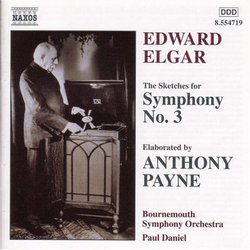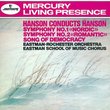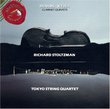| All Artists: Paul Daniel Title: Elgar: The Sketches for Symphony No. 3 Members Wishing: 0 Total Copies: 0 Label: Naxos Release Date: 5/16/2000 Genre: Classical Style: Symphonies Number of Discs: 1 SwapaCD Credits: 1 UPC: 636943471920 |
Search - Paul Daniel :: Elgar: The Sketches for Symphony No. 3
 | Paul Daniel Elgar: The Sketches for Symphony No. 3 Genre: Classical
Naxos's title for this disc is an outstanding example of honesty. Edward Elgar never wrote his Third Symphony; he left behind a mass of sketches that were in no sense a completed work. The detailed program notes for this d... more » |
Larger Image |
CD DetailsSynopsis
Amazon.com Naxos's title for this disc is an outstanding example of honesty. Edward Elgar never wrote his Third Symphony; he left behind a mass of sketches that were in no sense a completed work. The detailed program notes for this disc clearly explain what Elgar wrote and what use Anthony Payne has made of the materials. The result is a coherent, four-movement symphony, but only a hint of what Elgar's would have been like. Some striking material, including the opening theme of the first movement, grabs the listener's attention, but, for the most part, that material is dispersed in discursive development--not unlike, a cynic might remark, the style of Elgar's completed symphonies. This is not a major discovery, but those already fond of Elgar's music will welcome the disc, with its lively and sensitive performance, good recorded sound, excellent annotations, and bargain price, as a reasonable opportunity to investigate what might have been. --Leslie Gerber Similar CDs
Similarly Requested CDs |
CD ReviewsA gift for lovers of Elgar John Harrington | anywhere, USA | 05/30/2000 (5 out of 5 stars) "As far as I can tell from reading the notes of the CD and other sources, Payne's "elaboration" of Elgar's legacy of 3rd symphony sketches involved such unimaginable difficulties as providing a development section for the first movement, composing most of the finale and much of the adagio, as well as a coda for the 2nd movement! For anyone else it might have been justly called arrogant presumption, but not for Payne. His self-confidence in plunging into Elgar's unfinished masterpiece is fully justified by the results. This is every inch an Elgarian work, and it should be and will be treasured for years to come by Elgar enthusiasts. This recording, furthermore, does justice to the work, and makes a good case for its inclusion among the pantheon of Elgar masterpieces. Paul Daniel's reading is dramatic and convincing, with many subtleties to ponder over on repeated listenings. The Bournemouth orchestra provides a polished, faultless performance, which, nevertheless is never over-polished or routine." Another view, equally valid, in some ways better J Scott Morrison | Middlebury VT, USA | 06/11/2000 (5 out of 5 stars) "It's been more than two years since we had the first recording of the Elgar/Payne Third Symphony, by Andrew Davis and the BBC Symphony on NMC, who premiered it. I will attempt to compare this new recording with that of Davis. This recording is every bit as valid as that one. Payne has made some revisions which may make the work a bit stronger. In this recording, Paul Daniel, a conductor whose renown is growing, conducts a strong, more trenchant performance. Davis's version seems a bit round, soft in comparison. The first movement is more muscular here, yet the second subject is noble, melting. In the second movement, Daniel's approach makes the music seem more symphonic than in Davis's rather light-music approach. The third movement is stark but with occasional heroic and assertive outbursts revealing emotional depths not felt in Davis. Some have complained that in the Davis recording the ending of this movement is anticlimactic, but here its resignation and sadness are poignant. The last movement is, for me, the weakest of the symphony, perhaps because there are borrowings from some of Elgar's earlier music, but Daniel makes a case for it, and in particular the ending is moving. The performance is outstanding, as are the sonics. And then, of course, there is the super-budget price. A worthy addition to Elgar recordings." The saddest story... Michael Steinberg | Rochester, NY USA | 04/06/2005 (5 out of 5 stars) "The other reviewers on this page have covered most of the essentials. All I want to add is something sufficiently subjective to open up a different kind of objectivity. No, this isn't Elgar's Third Symphony (and doesn't claim to be); in some deep way it's a meditation on that non-existent work. To me it is a very strong piece, and strong in inimitably Elgarian ways. Regardless of what is Elgar and what is Payne, we are often taken aback by moments or connections that aren't Elgarian in their typicality but--far better--Elgarian in the kind of revelation they bring. And what Payne has done with them is create a finished work that is always gesturing towards its incompleteness, most of all in the strange yet hauntingly effective ending.
And all this is exactly as it should be. In the last two or three years of his life Elgar had felt his muse returning--in part, almost as with Janacek, through his attraction for a young performer. He surely knew how good the new material in the Symphony was. He was working again, and well, and for any artist there is no pleasure that is at all comparable. And then, of course, he was diagnosed with terminal cancer. Any hope that he had, delusory or not, that his strength would see the work to completion collapsed. The terrible pathos of Elgar's last months was not that his best work was long behind him. It was that he had once more come to life as the great artist he was, only to watch that life slip away--and with it his Third Symphony. I don't think it's over-interpreting to hear that pathos in Payne's brilliant yet respectful "elaboration." Nor is such duplicity alien to Elgar's other works, which are so often emotionally ambivalent and which also simultaneously celebrate his self-made place in the Western classical tradition and lament that tradition's passing. The sad grandeur of Elgar's best work is woven from this, and the "Elgar Third" now closes his career in splendor, reflection and sadness at once." |

 Track Listings (4) - Disc #1
Track Listings (4) - Disc #1












